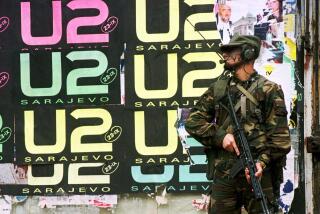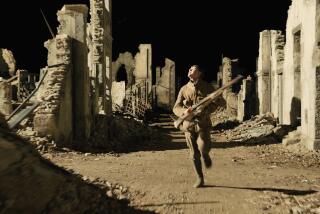TV REVIEW : ‘Yugoslavia’ an Invaluable History Lesson of Ethnic Wars
- Share via
American opposition to placing U.S. peacekeeping troops in Bosnia seems to fall into two groups: 1) Those who don’t know enough about the strife that has consumed the former Yugoslavia in the ‘90s; and 2) Those who know enough about it to know that it is a very bad place to be.
The second group may find their opinions only reinforced by the brilliant five-hour report on the Discovery Channel, “Yugoslavia: Death of a Nation.” But the first group, if they can hang in there for five hours over the holidays, may be in for a shock. There is no better primer on the Bosnia quagmire than this, with the smart narration of gutsy CNN correspondent Christiane Amanpour.
Bringing the same indefatigable attention to detail that they brought to their stunning series on Watergate, British producers Norma Percy , Paul Mitchell and Angus MacQueen have gone back to the beginnings of Yugoslav ethnic tension in the wake of the death in 1980 of Marshal Josip Broz Tito, whose hold on a unified state for four decades now looks shrewd. The three producers have also plumbed through miles of videotape to provide a beat-by-beat account of the sources and results of each battle ripping apart Tito’s former nation.
Center stage throughout is Serbia leader Slobodan Milosevic, who craftily exploited building tensions between Albanian and Serb ethnics in the southern state of Kosovo in 1987 to assert the claims of a “greater Serbia,” wrested power from then-Serb President Ivan Stambolic and orchestrated overthrows of anti-Serb Communist Party bosses in Serbia’s neighbors Montenegro and Vojvodina.
The report makes crystal-clear that this is the series of events that triggered an ugly domino effect of clashing nationalism. Milosevic’s dream of a dominant Serbia, with the help of the Yugoslav national army and cadres of Serb militias, had severe roadblocks in the north--Slovenia, with its progressive spirit of free speech; Bosnia, an impossibly complex checkerboard of Muslim, Croat and Serb ethnic strongholds; and Croatia, which veered between strong Western ties and a lingering Nazi tradition left over from World War II.
The first hour shows that little Slovenia proved a feisty opponent, while the second hour details the much bloodier battle for Croat land occupied by ethnic Serbs. Percy and company somehow managed to have Milosevic speak frankly about his goals, which are to ensure that Serbs control their own land, regardless of which state they reside. In Croatia, this led to the savage bombing of Vukovar and massive “ethnic cleansing.”
Croat President Franjo Tudjman, elected in 1990 on a platform of virulent nationalism complete with the flag and garb of Nazi-era Croatia, emerges here as a remarkably wily adversary to Milosevic. While defeated at Vukovar, Tudjman also makes deals with his Serb counterpart on the partitioning of Bosnia.
But this is nothing compared to the stream of eleventh-hour meetings that have happened at each crisis point in the Yugoslav mess. The viewer sometimes feels like an eavesdropper on one executive session after another, as men in suits sit around large tables trying to decide between uneasy peace or slaughter. These men also provide rich anecdotal accounts, as if the meetings were ballgames.
Two of these stand out here. A 1991 emergency meeting of the Yugoslav federation’s State Council becomes unbearably suspenseful, as the body decides whether or not to send the Yugoslav army into Croatia. The results destroy the federation, just as a crucial 1993 meeting of the Bosnian Serb assembly destroys a peace plan put forth by former U.S. Secretary of State Cyrus R. Vance and Britain’s Lord Owen that might have stopped the war in Bosnia. But the war was probably inevitable, and these five invaluable hours show why.
* “Yugoslavia: Death of a Nation” airs 10 p.m. tonight through Saturday on the Discovery Channel.
More to Read
Sign up for Essential California
The most important California stories and recommendations in your inbox every morning.
You may occasionally receive promotional content from the Los Angeles Times.













